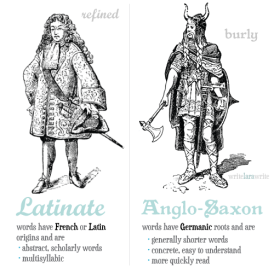Have you ever gotten feedback that your book is too literary?
Have you ever been told your protagonist is too old for his or her voice?
But my book is is full of sex and violence! How could you say it sounds middle grade?
Even if your content matches your age category and genre, your voice needs to match, too.
How do you make your voice match genre and age category?
First, determine whether you are using enough Anglo-Saxon or Latinate English.
See my post on the difference between the two by clicking here or on the image below.
Second, make sure your tone and subtext reflect the outlook of your protagonist’s age.
Here are a few observations for three age categories:
A Middle Grade protagonist is concerned about her abilities. She will observe what others are doing and how she fits in—because she does not want to be perceived as babyish or unable—but she still has fun without much effort. A MG voice uses more “can,” “could” and “will” language, probably because preteens think about what they can do currently and what they’ll be able to do in the future.
A Young Adult protagonist is concerned with his identity. What kind of person is he? Who influences the way he thinks? What circles is he in, and how does he act within each? How can he still have fun without wrecking relationships? Others’ perceptions might be more important than self awareness. Writing a YA voice isn’t about injecting slang, which is too easy to do wrong—it’s about implications and subtext that imply tone and feelings. It’s about generating emotional reactions. A teen is also thinking about the physical world in a relational context, so he/she is more likely to talk about body parts than MG or non-romance adult literature.
An Adult protagonist is concerned with purpose and priorities. She’s also going to be more concerned with practicality since she’s got to take care of herself (and possibly others). Work is important, her relationships are important, and she’s still learning more about herself. She’ll be more concerned about consequences than teens or children, so when figuring out personal pursuits, she’s more likely to question whether she’s shirking responsibilities. An adult is more likely to be nostalgic about his or her childhood, looking to the past to inform the future. He or she might also have more regret. Words like “would” and “could” are more likely to creep in.
See Kyra Nelson’s post on her linguistic studies of YA literature and how it differs from children’s and adult lit. It’s fascinating!
Do you agree with these observations? Disagree?



Hi Lara, I had that very problem. I like to write adult / new adult sweet romances and it was suggested that because of my voice, I should try YA. So, I did and the first YA I wrote, I got a publishing contract. You might be on to something!
Excellent information and links, Thanks, Lara! I struggle with writing PB characters “too old” – and though I’ve made great strides on improving, I’m always happy to have more resources to help me evaluate what it is that makes them sound that way.
Thanks for reading! Going for Anglo-Saxon words or shorter words should definitely help 🙂